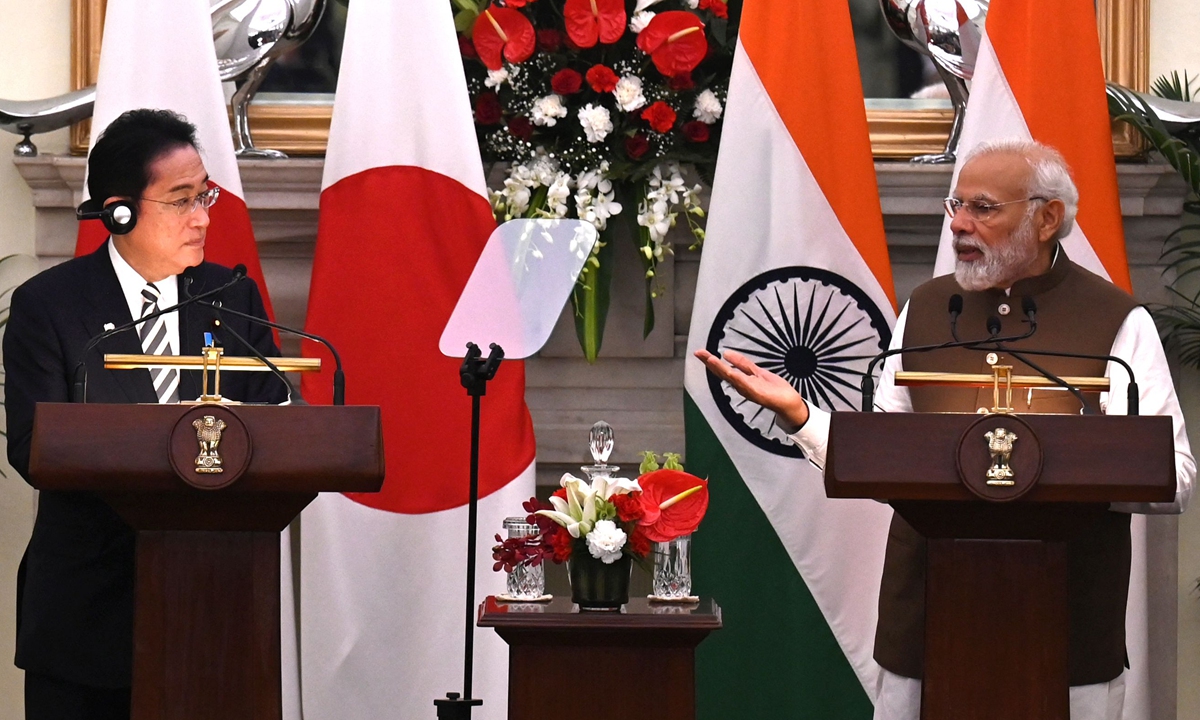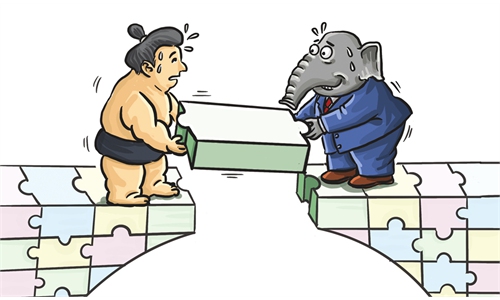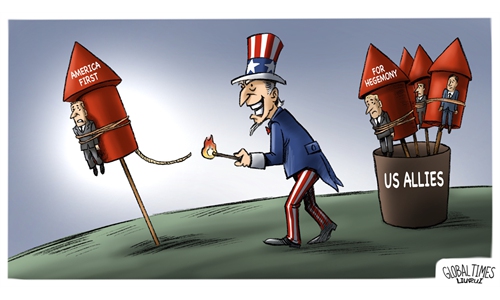Kishida's India visit raises concerns of bloc confrontation
Asia-Pacific is ‘not an arena for geopolitical games’

Japan's Prime Minister Fumio Kishida (L) and his Indian counterpart Narendra Modi attend a joint media briefing at the Hyderabad House in New Delhi on March 20, 2023. Photo: VCG
Japanese Prime Minister Fumio Kishida arrived in India on Monday for a two-day visit after just seeing off South Korean President Yoon Suk-yeol and German Chancellor Olaf Scholz in Tokyo. Such active diplomacy, which came as the US is giving most of its attention to the Russia-Ukraine conflict and Japan is chairing the G7 this year, has raised concerns of aggravating bloc confrontation in the region.
At a joint press conference after meeting with Indian Prime Minister Narendra Modi on Monday, Kishida said he would announce a so-called new plan on the Free and Open Indo-Pacific (FOIP) on the soil of India.
Kishida said that he and Modi had concurred on a range of issues including food security, and fair and transparent development finance, The Indian Express reported.
Modi told media that they also reviewed progress in bilateral relations including in the area of defense. He said both sides also discussed the importance of reliable supply chains for semiconductors and other critical technologies, according to media reports.
Although having not clearly mentioned China, some of the topics they talked about would concern China, such as transferring Japan's industrial chains to India and bilateral military cooperation, experts said.
Liu Jiangyong, vice dean of the Institute of Modern International Relations at Tsinghua University, noted that Japan had been actively implementing its strategic intention since the approval of the National Security Strategy in December 2022. The US is putting most of its focus on the Russia-Ukraine conflict, leaving space for Japan to actively promote its FOIP in the region, according to Liu.
This year, Japan holds the presidency of the G7, while India chairs the G20. Kishida reportedly extended a formal invitation to Modi to attend the G7 Hiroshima summit, scheduled to take place in May this year, which was reportedly "immediately accepted" by the latter.
Japan wants to take the presidency of the G7 this year as an opportunity to demonstrate its existence in international issues. Besides Modi, Kishida probably would also invite South Korean President Yoon Suk-yeol, Liu predicted.
The country wants to turn this year's G7 meeting into a geopolitical weapon that targets China, Russia and North Korea, Liu noted.
India will also take the opportunity to attend the G7 meeting as a manifestation of its rising international status. It also hopes to deepen cooperation with Western countries at the meeting, especially economic and military cooperation, according to experts.
The Asia-Pacific is not an arena for geopolitical games, Chinese Foreign Ministry spokesperson Wang Wenbin said Friday when asked for comments on Kishida's visit to India.
Cooperation between certain countries should be conducive to enhancing mutual understanding and trust between regional countries and regional peace and stability, rather than target any third party or harm its interest, Wang said.
Certain countries have been vocal about promoting "freedom and openness" in what they called "Indo-Pacific," but they are in fact putting up a small circle featuring bloc confrontation. We have no interest in such action plans. What we are concerned about is Japan's plan to willfully discharge the nuclear-contaminated water into the Pacific, Wang said.


